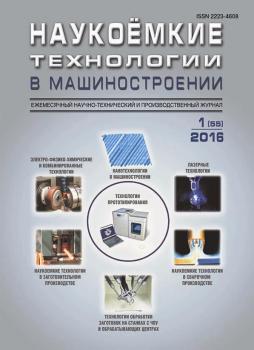Ul'yanovsk, Ulyanovsk, Russian Federation
Ulyanovsk, Ulyanovsk, Russian Federation
Ulyanovsk, Ulyanovsk, Russian Federation
The results of experimental studies of the effect of processing conditions on the corrosion resistance of ground parts made of stainless chromium-nickel steel of austenitic class 12X18N9T2 are quoted. It is found that the introduction of ultrasonic field energy into the zone of generation of geometry during grinding makes it possible to increase the corrosion resistance of parts by 12...15%, depending on the grinding mode.
performance, ultrasound, corrosion, residual stresses, microhardness, roughness
1. Luchkin, R.S. Metallics corosion and preven-tion(structural and chemical factors), Tolyatti: TGU Publ., 2017, 269 p.
2. Parshin, A.M., Tikhonov, A.N., Kikichev, R.N. Corro-sion of Metals in Nuclear Power Machine Engineering [in Russian], St. Petersburg: Politekhnika, 2000, 104 p.
3. Physical-technological fundamentals of processing me-thods./ A.P. Babichev, M.A. Tamarkin, V.A. Lebedev, et al. Textbook, manual for universities, Rostov-on-Don, Phoenix, 2006, 409 p.
4. Kumabe, D. Vibrating cutting. Moscow: Mechanical Engineering, 1985, 424 p.
5. Kiselev E.S., Malyshev V.I., Kovalnogov V.N. New ul-trasonic technologies of machine parts production. Tolyatti: TGU Publ., 2014, 327 p.
6. Kiselev, E.S. Intensification of machining processes us-ing the energy of the ultrasonic field: a training manual, Ulya-novsk: UlSTU, (2003), 186 p.
7. Kiselev, E.S. Modern ultrasonic dimensional technolo-gies of mechanical processing of hard-to-process and compo-site materials / Science intensive technologies in Mechanical Engineering, 2020, No. 9 (111), pp. 33-39.
8. Kiselev, E.S., Blagovsky, O.V. Controlling the forma-tion of residual stresses in the manufacture of critical parts. Monography, St. Petersburg: Lan, 2020, 140 p.















